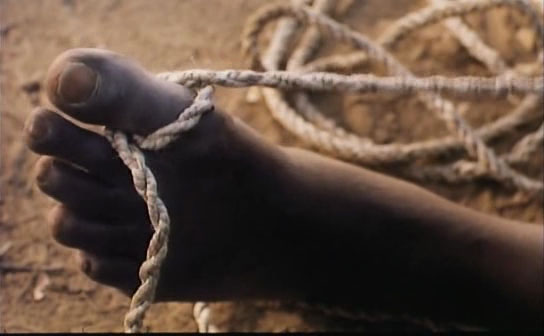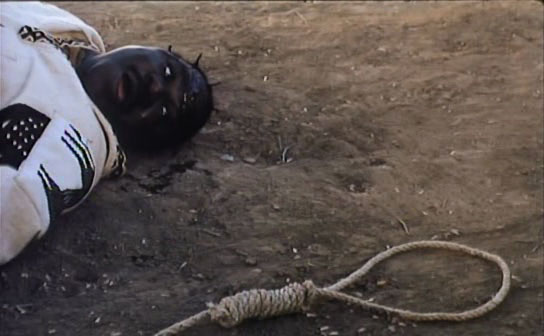Both this and Genesis required all my concentration to figure out who was who and what was happening.
A girl and her dad:

Magic man Mambi has a daughter Jangine, and he promises her in marriage to the son of powerful leader Guimba. Twenty years later she is beautiful and Guimba’s son is a perverted dwarf, so she wants to marry a hot dude instead. So Guimba, a scary, easily-angered man who hides from sunlight, drives her father and all hot dudes from the village and demands she marry the son as planned.

But the son doesn’t want to marry Jangine – he prefers his women more full-figured. This is fine with Guimba – he’ll let the son marry his large mistress while Guimba takes the girl for himself. The father sends some magic boogedy into town, Guimba kills his son then exposes himself to capture and ridicule by the townsfolk, and presumably kills himself.

Jangine would star in Moolaade (Katy recognized her; I didn’t). The griot appeared in Bamako, and the daughter’s father has been in everything: Finye, Yeelen and Genesis among them. We liked it alright – Katy says it was more confusing than Genesis, because at least she’d read the book of Genesis and seen Joseph and the Amazing Technicolor Dreamcoat but with Guimba we had no frame of reference.

R. Ames in his African Filmmaking book:
Sissoko turned away from the basically realistic approach of his first two features with Guimba The Tyrant. Already, in Finzan, Sissoko had drawn on the popular Malian koteba theatrical tradition in the portrayal of Bala, the village idiot. Now in Guimba he moved further in the use of African oral traditions to shape the whole film – creating a narrative full of abrupt shifts in time and place and unexpected digressions – the shift in style typified by the appearance of a griot at the beginning and end of the film, introducing the tale and commenting on its aftermath. The inset story, which focuses squarely on tyrnny and the need to oppose it, has obvious contemporary relevance, as many commentators have noticed, to the overthrow of the Malian dictator Moussa Toure in 1991. But the film is shaped as a fable mixing elements of farce and the supernatural and with constant shifts in mood and direction. It chronicles the rule of Guimba and his dwarf son Jangine, putting emphasis on their brutality, on the constant praise-singing of their eloquent but two-faced griot, and also on their ludicrous sexual desires: Jangine rejects the beautiful Kani, to whom he was betrothed as a child, in favor of her more than amply proportioned mother, Meya. The exile of Meya’s upright husband by Guimba, who covets Kani for himself, trigers the ruler’s eventual downfall, chronicled in an often confusing sequence of confrontations played out in splendidly evocative costumes within the visually impressive setting of Djenne, one of Mali’s ancient Saharan trading centres. As Sissoko has rightly said, Guimba “opens the door to audiences for understanding our history through our cinema. Obviously, some aspects will seem odd or not readily comprehensible, but the door to dreaming and discovery is open to those who wish to enter it.”
